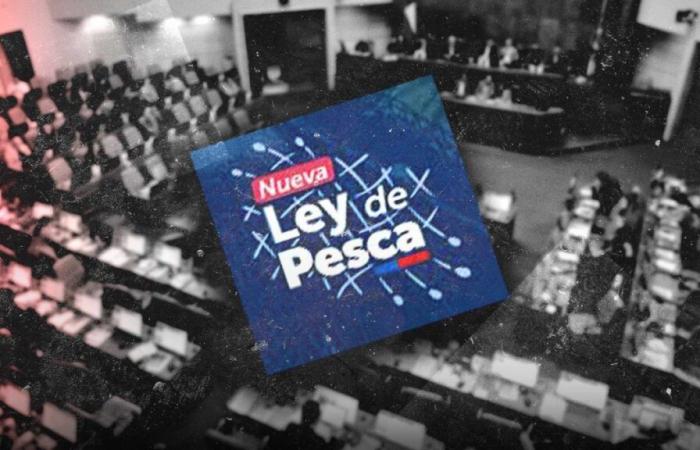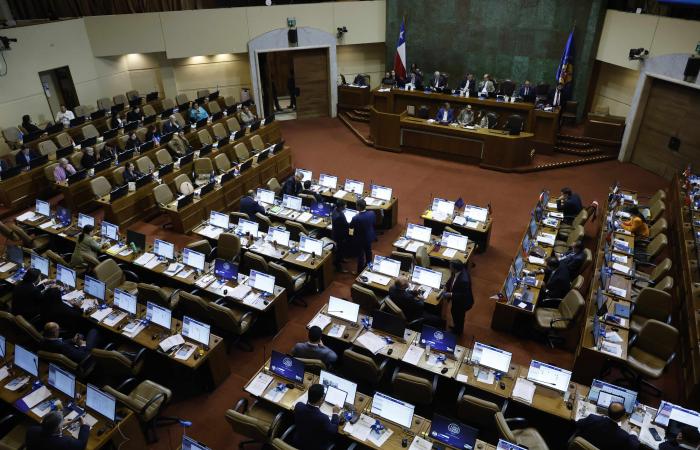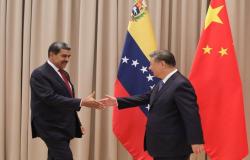23 abr. 2025 – 10:35 hrs.
Parliamentarians condemned by bribery, irregular financing of intensified politics and lobby were only some of the episodes that marked the plot of controversy Fishing Law -O known Longueira law-, which adds more than ten years of operation, but that could come to an end.
Congress is currently discussing the proposals that create a New Fisheries Law and of Divisionboth presented by the government of the President Gabriel Boric To leave behind the current regulations, surrounded by accusations of corruption. Send your complaint to Mega investigates here
However, the process has not been exempt from questions. In it sector industrial They ensure that the two initiatives favor the Artisanal fishingwhile, from the opposite path, artisanal fishermen accuse that the modifications that the Parliament has implemented benefit industrial fishing. A discomfort that – even – has been expressed with protests outside the Congress. The demonstrations were recorded at the end of March and left a quota of four detainees and an injured carabinero.
The repairs by those involved in the fishing sector have tried to be sincere in meetings with legislators, requested through the Lobby law. The deployment to specify these hearings has been intense, and they are not only instances in which expressed concernbut have also presented Indications to be considered in the process.Go to the next note
Mega Investiga reviewed the lobby movements informed by Deputies, senators and the Undersecretariat of Fisheries Between December 2023 – when the new project was announced – and April 2025. After the analysis, they identified around 260 audiences requested by various associations, companies and fishermen guilds, and the ranking of the parliamentarians who recorded the most audiences were verified.
The industry lobby
They are at least 50 associations, companies, guilds or people They have asked for meetings with parliamentarians. A number that shows that the discussion of the new fishing and subdivision law is in the sights of all sectors. However, among them there are some that are repeated more than others.
One of them is Biobío Ag industrial fishermenunion and non -profit organism that promotes the development of industrial fishing. It consists of five companies: Blumar Seofoods, Landes SA, Camanchaca Fishing South, Pacificblu and Foodorp SA.
The association -previously known as Asipes and investigated for bribery and bribery to politicians, in a derivative of the case Corpesca– It has been contrary to the proposal for a new fishing law, arguing that it was created in favor of artisanal fishing. They even launched a website in which they warn the consequences that the initiative could have in case of approved. “The big problem of the project presented by the Government has to do with its founding idea and that contains serious errors and wrong perceptions,” they say.
Given the alert, Biobío Industrial Fishermen has requested various lobby meetings with both parliamentarians and the Undersecretary of Fisheries, Julio Salas.
On March 25, 2024, for example, the president of the guild, Macarena Cepeda Godoy He attended an audience in which officials of the Undersecretariat of Fisheries participated. The reason for the meeting was recorded as follows: “Attendees were heard, on the guild’s approach to review in the new fishing law project, the bidding percentage of the jurel in the South Central Fishery.”
Exactly a year later, on March 25 of this year, the association met with the deputy Joanna Pérez (Democrats) To “publicize the impact” of the bill that sets a new subdivision.
Despite the efforts of the guild, the companies that make it up also register audiences with political authorities. PacificBlufor example, between 2024 and 2025 he requested various lobby meetings with both senators and deputies, under the reason for presenting the company’s situation before the project of new fishing and fractionation law.
The company has also been contrary to the progress of the new proposals, questioning that if approved, the workers of the company could see “threatened their future labor”, according to a publication on its website of April 12, 2024.
A similar argument lifted the FISHING SOCIEDAD LANDES SAanother of the companies that appears in the register of audiences and that is part of industrial fishermen of the Biobío AG
Society, which has been represented by Carla SánchezManagement of Corporate Affairs and People, requested meetings with parliamentarians and the Undersecretary of Fisheries, to expose that the approval of the subdivision law would imply “the loss of 50% of Landes’ historical quotas, putting at risk the continuity of a company with more than 60 years of history in Talcahuano”.The latest
By the opposite path, the Guild Association of Entrepreneurs of Small Fisheries Plants (Agrippes Chile) -What is in favor of the new fishing law- it also appears in the register of audience requests.
The guild has participated in meetings with parliamentarians from the PC to the UDI and the Undersecretariat of Fishing, in search of “sponsorship in indications of the fishing law.”
-
Deputies and Senators: from the PC to Republicans
Both the new fishing law and the fractionation law began their discussion in the Chamber of Deputies, specifically in the commissions of Fishing y Hacienda. The deputies of both instances have received managers of interest who seek to dialogue about the initiatives.
In the case of the members of the Fisheries Commission –which add up to 67 audiences-, the parliamentarian who records the most lobby meetings is Leonidas Romero (National Libertarian Party), with 14 Hearings. They follow him Sergio Bobadilla (Udi) with 11, María Candelaria Acevedo (PC) con 9 y Eric Aedo (DC) and Bernardo Berger (RN), ambos con 8.
Unlike the Fisheries Commission, the Treasury only accounts for two lobby meetings requested to Miguel Jagged (Rn) y Camila Rojas (FA).
However, the interested parties or representatives of the associations not only requested a hearing with the deputies who integrate the instances that discuss the detail of the initiatives, but also to other parliamentarians.
In total they are recorded 41 audiences With various deputies, such as Roberto Arroyo (Christian Social Party) that informs 8, Renzo Trisotti (Rep) with 5, Karen Medina (independent) details 4 y Clara Cagardía (FA) 3.
In the upper house the situation is similar. They register 7 audiences With senators of the Maritime Interest Commission, Fisheries and Aquaculture, 6 with those of Hacienda y 16 with whom they do not integrate either instances.
Sebastián Keitel (Evópoli) is the one with the most lobby hearings, with 11. Then it comes Carlos Kuschel (RN) con 7, Luz Even (Udi) with 4 y Ricardo Lagos Weber (PPD) con 3.

The hearings of the Undersecretary of Fisheries
Between December 2023 and March 2025, the Undersecretariat of Fisheries reported 121 Hearings they lobby. Most of them, that is 91, appear in the Registry of Undersecretary Salas.
Among them there are seven meetings with the National Fisheries Society (Sonopesca), sometimes represented by its president Felipe Sandoval. In one of the most recent hearings, which occurred on January 13, 2025, the company formulated “observations on the fractionation bill”.
A similar action had Lota Protein S.Athat on January 6, 2025, he made an audience with the Undersecretary, in which he requested information on the processing of the projects and raised “observations and indications” for initiatives.
The other hearings registered by the Undersecretariat of Fisheries correspond to the Cabinet Headquarters of the Undersecretary, Advisors and Zonal Directors of Fisheries and Aquaculture of different regions. Those who have requested these meetings, meanwhile, are representatives of the industrial and artisanal world.

The discussion of the new fishing law is still based in the Chamber of Deputies. However, sources participating in the process assured Mega investigated that in the middle of this year he could start his debate in the room.
The proposal of the subdivision law, meanwhile, has had considerable advances. This Monday, the Lower House Room passed the initiative –which is considered the heart of the new fishing law– a Mixed Commissionso that senators and deputies unlock the main knotswhich point to the fees defined for the Widow, Spanish sardine and common hake.
In the case of anchovy and Spanish sardine, there is no agreement between the forces of the Congress to define a greater quota in favor of the artisanal fishing sector in the area between the regions of Arica, Tarapacá, Antofagasta, Atacama and Coquimbo. From the government, according to the original project, they aspire to be 80% for artisanal fishing and 20% for the industrial sector.
Similar issue occurs with hake. The Executive had proposed a quota -among the regions of Coquimbo, Valparaíso, O’Higgins, Maule, Ñuble, Biobío, La Araucanía, Los Ríos and Los Lagos- of 43% for the artisanal fishing sector and 57% for the industrial. During the discussion in the Chamber of Deputies, it was modified by 70% and 30%, respectively, but the Senate suppressed the change.
All about Mega investigates







